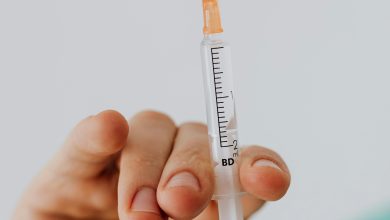List of Drugs that Can Cause Cellulitis

Drug-induced cellulitis refers to the development of cellulitis, a bacterial skin infection, as a result of certain medications. Some medications can compromise the immune system or cause skin reactions that make it easier for bacteria to enter the skin and cause an infection.
It’s important to note that drug-induced cellulitis is a rare side effect of certain medications, and not all individuals taking these medications will experience this complication.
Many factors and medications that can potentially lead to drug-induced cellulitis they include:
1. Immunosuppressive Medications: Medications that suppress the immune system are often prescribed to manage autoimmune diseases or prevent organ rejection after transplantation. Corticosteroids, such as prednisone, are commonly used to dampen inflammation. However, these drugs can weaken the body’s immune defenses, making individuals more susceptible to infections like cellulitis. For instance, a person with rheumatoid arthritis taking corticosteroids might experience a compromised immune response, increasing the risk of developing cellulitis after a minor skin injury.
2. Chemotherapy: Chemotherapy is a powerful treatment used to combat cancer by targeting rapidly dividing cells. Unfortunately, this also includes healthy immune cells. Chemotherapy drugs like paclitaxel or doxorubicin can suppress the immune system, leaving cancer patients more vulnerable to infections. A patient undergoing chemotherapy might develop cellulitis at the site of a small cut due to the weakened immune response.
3. Medications Causing Skin Reactions: Certain medications can trigger adverse skin reactions, creating openings in the skin that allow bacteria to enter. For example, some individuals might experience severe allergic reactions to medications like penicillin, resulting in hives or blisters. These skin reactions can compromise the skin’s barrier and pave the way for cellulitis-causing bacteria to infiltrate.
4. Intravenous Drug Use: Intravenous drug use, especially when needles are shared or not properly sterilized, carries a high risk of infection transmission. Bacteria can enter the bloodstream directly through contaminated needles, leading to serious infections like cellulitis. An individual who engages in intravenous drug use and shares needles could contract cellulitis due to bacterial contamination.
5. Underlying Medical Conditions: Certain medical conditions can increase the risk of developing cellulitis. For instance, diabetes mellitus affects blood sugar control and weakens the immune system’s ability to fight infections. A diabetic person with uncontrolled blood sugar levels might develop cellulitis from a small cut or wound that becomes infected due to compromised immune responses.
6. Topical Medications: While topical medications are applied directly to the skin to address specific issues, they can sometimes cause skin reactions. For example, an individual using a topical antibiotic ointment might experience an allergic reaction that results in redness, swelling, and blisters. These reactions can damage the skin barrier, providing an opportunity for bacteria to invade and cause cellulitis.
What to do
If you suspect that you have developed drug-induced cellulitis, it’s important to take prompt action to manage the infection and prevent potential complications. Here are steps you should consider taking as a patient:
1. Seek Medical Attention: Contact your healthcare provider as soon as possible. Describe your symptoms, any recent medication changes, and any known allergies. They will be able to evaluate your condition, determine if the cellulitis is related to medication, and provide appropriate treatment.
2. Follow Medical Advice: Follow your healthcare provider’s instructions closely. They may recommend stopping or adjusting the medication that might be causing the cellulitis. If antibiotics are prescribed, take them exactly as directed, even if you start feeling better before the course is completed.
3. Monitor Your Symptoms: Keep a close watch on the progression of your symptoms. If you notice any worsening redness, swelling, pain, or if you develop fever or chills, notify your healthcare provider immediately.
4. Practice Good Hygiene: Keep the affected area clean and dry. Avoid scratching or picking at the area to prevent further skin damage and the risk of introducing more bacteria.
5. Elevate and Rest: If the cellulitis is on your extremities, elevating the affected area can help reduce swelling. Resting and taking it easy can also aid in the healing process.
6. Stay Hydrated and Nourished: Proper hydration and nutrition support your body’s immune response. Drink enough water and consume a balanced diet to aid in the healing process.
7. Avoid Self-Treatment: Do not attempt to treat drug-induced cellulitis on your own using over-the-counter creams or ointments. It’s essential to receive appropriate medical care to ensure effective treatment and prevent complications.
8. Prevent Future Infections: If your cellulitis was caused by a skin reaction to a medication, be cautious when using new medications in the future. Inform your healthcare provider about any medication allergies or sensitivities you have.
9. Communicate: Keep your healthcare provider informed about any changes in your condition, including improvements or worsening of symptoms. Open communication will help guide your treatment and recovery.
10. Follow Up: Attend any follow-up appointments scheduled by your healthcare provider. They will assess your progress, ensure the infection is resolving, and make any necessary adjustments to your treatment plan.
Remember that cellulitis can progress if not treated appropriately, and drug-induced cellulitis might require specific actions related to medication management. Your healthcare provider is the best resource to guide you through your treatment and recovery process. If you have any concerns or questions, don’t hesitate to reach out to them for guidance.





